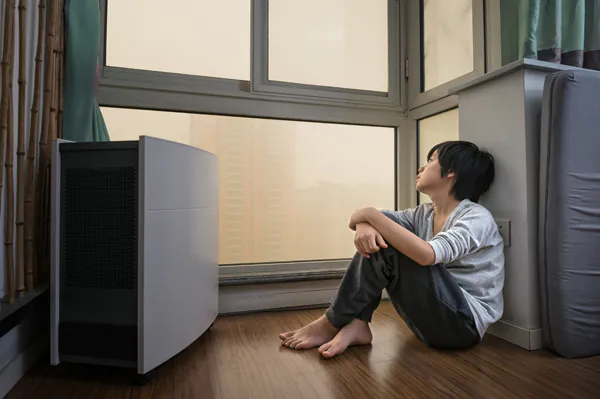A Central Air Conditioner is similar to a huge refrigerator as part of a central heating and cooling system. In fact, it utilizes the same types of components, materials, and systems as a refrigerator, including that it modifies from liquid to gas and back to liquid as it travels throughout a system of tubes and coils or fins that assemble and give off heat. In stark difference, window A/C units cool only one room or area. Trying to cool the whole home with a window unit would require not only the difficulty of managing every separate unit, but it would also need more energy and be extremely noisy.
Essentially your air conditioner works by pumping chilled air throughout your home or building through a system of air ducts by following the 4 steps below:
Step 1:
Your thermostat signals the air conditioner unit to turn on.
Step 2:
The air-handling unit kicks on and draws air from various parts of your home through return air-ducts.
Step 3:
That air is pulled through the filter and any foreign airborne particles are removed.
Step 4:
That air then travels to the air-supply ductwork that releases cool air back into your home.
How does the air get cold?
The evaporator coil in your air conditioner unit is what transforms the warm air from within your home cold. Fans move that warm interior air over refrigerant filled coils. When the warm air is forced over the cold evaporator coil the refrigerant is able to absorb the heat as it changes from a liquid into a gas.
Your central air conditioner will then convert the refrigerant back into a liquid again to continue the cooling process. How does that happen? Well the compressor puts that gas under high pressure to create unwanted heat. That extra heat is then pushed outside through the condenser coils and second fan. As the gas begins to cool it turns back into a liquid state and the process starts all over again in an endless cycle to ensure that your home feels cool and comfortable.
The Process of Cooling Your Home with AC
Your air conditioning units make use of chemicals that change from gas to liquid and back again rapidly. These chemicals convey the heat from the air within your property to the outside air. It consists of three key parts of the AC unit: compressor, the condenser, and the evaporator. Generally the unit’s compressor and condenser are located in the exterior part of the air conditioning system separate from the fan unit. In the interior of your house the evaporator will be found, a grill to protect persons from coming into contact with the fan blade.
The cooling fluid reaches the compressor as a low-pressure gas. The compressor compresses this gas or fluid, and the molecules in the liquid are jam-packed closer together. The closer the compressor forces these molecules jointly, the higher the temperature and energy rise. The coil absorbs the heat from the air.
Benefits of Central Air Conditioner
- Indoor soothing during warm weather: Central air conditioning assists to maintain your home cool and diminish humidity levels.
- Cleaner air: Central air conditioner filters the air circulating through the air ducts, the air is pulled through air filters, which reduce flying dust and lint particles and reduce humidity level. Difficult filters may get rid of microscopic pollutants, as well. The filtered air is then routed to air supply duct-work that carries it back to rooms.
- Lowest noise level: Because the compressor unit is located exterior to the home, the indoor noise level from its process is much lower than that of a free-standing air conditioning.
- Heating Capabilities: It has all the duct work your home requirements for central heat, so you don’t have to worry about maintaining two different systems. It can offer heating capabilities, as well as their cooling capabilities.
- Low maintenance and reduced cost
Central AC requires low maintenance. You just have to hire a technician for annual inspection and routine service and your AC should run at optimal levels for many years. Just don’t ignore the small repairs or replacements and you will see how much money you will save just within few years. - Reduce humidity levels
The most beneficial factor about central AC is that it reduces the humidity level throughout the home environment. This will improve the air quality and you will create a very healthy environment.
Does it feel like your central AC unit isn’t working properly? Call us today and a skilled HVAC expert will be at your door to inspect your air conditioner system to let you know if it is in need of a new central air conditioning installation, any repairs, or maintenance.



0 Comments